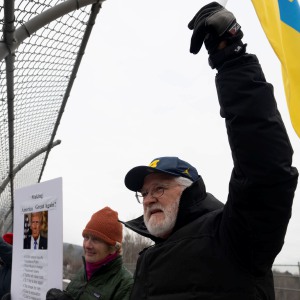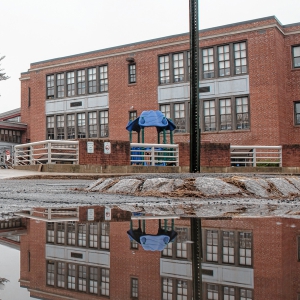Guest column: UMass protest response review was just a whitewash

Police arrested more than 130 people at a pro-Palestinian protest on the University of Massachusetts campus the night of May 7, 2024. CONTRIBUTED/LAUREN LECOURS
| Published: 02-06-2025 4:36 PM |
On May 7, 2024, UMass Amherst Chancellor Javier Reyes deployed police who arrested, often violently, 134 peaceful activists who were protesting the U.S.-Israeli genocide. Part of the administration’s damage control strategy was to commission an “independent review” of its actions, carried out by the Massachusetts law firm Prince Lobel under the direction of Republican ex-district attorney Ralph Martin.
After a seven-month investigation, Prince Lobel released its report on Jan. 13.
The firm unsurprisingly defends its client: “We have little difficulty concluding that the Administration acted reasonably when it decided to remove the April 29 and May 7 Encampments. Its assessment of the risks, especially of violence, was understandable based on the information it had.”
There is no reason to expect that an investigation commissioned by UMass officials would conclude that UMass officials were anything but reasonable. The chancellor got the whitewash that he (that is, Massachusetts taxpayers) paid for.
The Prince Lobel report concedes that Reyes overestimated the danger posed by the protesters. Yet good faith is always assumed. Reyes and his team genuinely “believed that particular characteristics of the May 7 Encampment reflected an urgent health and safety risk.” This claim is central to the report’s “finding” that Reyes did not discriminate against advocates for Palestinian rights. The sources and evidence for this conclusion are unspecified.
Whenever the authors meekly offer a critique, they hasten to attach a qualifier. “We have the benefit of information and hindsight that the Administration did not enjoy.” Reyes was acting “in real time and under pressure.” His misperceptions were “understandable.”
Most of the report’s central “findings” are false, misleading, or unsubstantiated. I and other witnesses provided the investigators with evidence that refutes the Reyes administration’s narrative. They ignored that evidence almost entirely.
Article continues after...
Yesterday's Most Read Articles
 Long-vacant former Faces spot in Northampton gets new tenant
Long-vacant former Faces spot in Northampton gets new tenant
 Here come the sweetness: Four new businesses prepping to open in downtown Northampton
Here come the sweetness: Four new businesses prepping to open in downtown Northampton
 Local ‘Hands Off!’ standouts planned as part of national effort
Local ‘Hands Off!’ standouts planned as part of national effort
 Northampton schools probe staff response to student’s unfulfilled IEP
Northampton schools probe staff response to student’s unfulfilled IEP
 Area property deed transfers, April 4
Area property deed transfers, April 4
 Sabadosa, Velis push for state endometriosis task force to raise awareness about little-known illness
Sabadosa, Velis push for state endometriosis task force to raise awareness about little-known illness
Notably, in negotiations with students on the afternoon of May 7, the chancellor and his team never described the protesters as a threat to anyone’s safety. I observed that meeting and transcribed as much as I could type.
One of the students asked, “Who’s being made unsafe by [the] encampment?” The chancellor did not offer an answer. In justifying his order to remove the tents, he replied, “The main reason is we have a land-use policy.” An obscure bureaucratic rule, not an alleged safety risk, was his primary stated justification.
Furthermore, neither the campuswide email from interim Provost Mike Malone on May 1 (following the previous encampment of April 29-30) nor the email from Reyes the evening of May 7 described the protesters as a threat. As late as May 9, a news report noted that “UMass has not pointed to any incidents of violence among the protesters or specific threats that warranted involving law enforcement.”
Administrators’ public story shifted thereafter. On May 14, Reyes told the Faculty Senate that protesters had used “violent rhetoric” and engaged in “verbal and physical intimidation of staff.” He also referred to their makeshift collection of wooden pallets as “a fortified encampment,” as if they had built a military bunker replete with artillery.
Reyes also introduced the new claim that “one counter-demonstrator reported being assaulted before police had arrived” and that the report had influenced his decision. Opponents of the protesters ran with this story. One news story cited unattributed “reports that a Jewish counter-protester was assaulted and injured,” a claim later retracted.
Reyes’ claim was false. The incident occurred, and was reported, at around 6:40 p.m. — hours after “police had arrived” on campus. Moreover, it occurred at considerable distance from the encampment, did not involve protesters, and entailed such little physical contact that the counter-protester, who was known for trying to provoke protesters, declined to pursue the complaint.
The Prince Lobel report acknowledges that this incident “played no role in the Administration’s response to the encampment, which was already determined earlier.” Thus the report’s own findings refute the chancellor’s claim about timing and his claim that the incident was “among the risks I had to consider.” The authors do not directly acknowledge these false claims, however.
The report does suggest the administration could have pursued “other paths.” Yet it also validates Reyes’ claim that “involving law enforcement [was] the absolute last resort.” These statements are incompatible. As the Prince Lobel investigators knew, Reyes and his team were informed in advance of the arrests that “other paths” were available. The student negotiators had told Reyes of other campuses where administrators had chosen not to deploy police against Gaza solidarity encampments.
The repression at UMass and the Prince Lobel whitewash are particularly disturbing given the national context. Amid the Orwellian dystopia of U.S. politics, universities must be beacons of truth and honesty. Many students and employees are trying to fulfill that mission. Unfortunately many administrators are more concerned with appeasing big donors, corporate partners, and right-wing politicians.
Confronting disinformation and authoritarian rule must begin at the local level.
Kevin A. Young teaches history at the University of Massachusetts Amherst. A longer version of this piece appeared in the Amherst Indy online.






 Guest columnist Dr. Shelley Berkowitz: Single-payer health care just needs vote
Guest columnist Dr. Shelley Berkowitz: Single-payer health care just needs vote Guest columnist John Saveson: Use your spending power for the planet
Guest columnist John Saveson: Use your spending power for the planet Betty Ussach-Schwartz: The greatest grift of all
Betty Ussach-Schwartz: The greatest grift of all Jerry Halberstadt: Problems at Northampton Housing Authority seen in many housing programs
Jerry Halberstadt: Problems at Northampton Housing Authority seen in many housing programs
